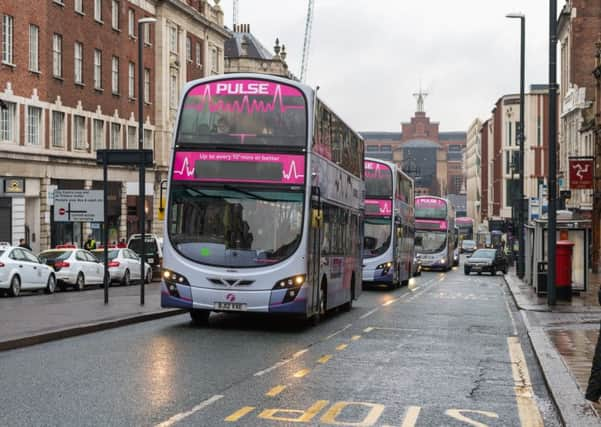Carmel Harrison: Buses must be reliable and affordable – unfortunately they’re not in Leeds


Frustrated, they are returning to their cars further, adding to the congestion and pollution that is gridlocking our roads. Often forgotten or ignored, commuters who rely on buses face a constant battle to get to work, keep hospital appointments, shop or access leisure opportunities because of regularly delayed or cancelled services.
Advertisement
Hide AdAdvertisement
Hide AdWhen they do turn up, they are unaffordable for many because day tickets are £4.90 a day which, for those on low incomes, can eat an hour’s pay.
After the debacle which was the Trolleybus, Leeds City Council was given £174m by the Government to be spent on improving public transport in the city within three years. We are almost at the end of year one, and what have we got to show for it?
Not much. Naively, I expected more frequent services, new bus routes, more environmentally efficient buses and shuttle buses connecting key points within the city centre.
Ambitiously, I wanted shuttle services to major industrial and business sites enabling those on low incomes to access employment. I’m still waiting. What we have seen some of the money spent on is a Leeds Transport Strategy that features a commitment to a high frequency bus network which has ignored two outlying towns and fails to connect business and industrial parks.
Advertisement
Hide AdAdvertisement
Hide AdIt has also seen highly paid consultants knock on the doors of some of the most deprived people in the city to ask them what they want of a bus system. Unsurprisingly, public engagement has not been high.
Nor has this come cheap. So far £1m has been spent on PR and a further £5m on feasibility works. There has been little of the £174m spent directly on improving public transport. And recent job vacancies at West Yorkshire Combined Authority suggest a lot more is set to be spent on communication.
Meanwhile commuters, businesses and tourist endure overcrowded, highly polluting buses which can mean they are left stranded at bus stops. Yet public transport is meant to be just that. A public network to enable people to get efficiently and affordably from A to B.
It isn’t working and a recent meeting with one bus company suggest it isn’t going to be fixed any time soon. Their ambition for punctuality is the end of this year. It’s only February!
Advertisement
Hide AdAdvertisement
Hide AdBefore any more money is wasted, some of the £174m must be spent on redrawing the ambitious Leeds Transport Strategy map to include both Rothwell and Wetherby on the high frequency, high speed routes. High frequency must mean every 10 minutes in peak periods and every 15 minutes the rest of the day.
The advent of a 24/7 retail and leisure environment also applies. As work patterns change, people need to get to work, often on out of town industrial estates, before 5am and after 11pm. Often low paid, their need for public transport is one of the greatest. Bus routes must accommodate that.
Affordability is critical to achieve the Leeds Transport Strategy ambition of doubling passenger numbers. At £4.90, a day ticket is beyond the reach of many. Given the highly popular Park and Ride day tickets are only £3 or cheaper when bought in bulk, that should be applicable on all daily commutes.
To ensure success, buses must be reliable. Bus operators hide behind congestion, driver availability, weather, bus breakdowns.
Advertisement
Hide AdAdvertisement
Hide AdThe reality is they are commercial organisations with shareholders and are unwilling to introduce new routes or additional services without evidence they will be financially viable. The fact that the population of Leeds has expanded in recent years isn’t incentive enough.
If the steady decline is to be halted, and Leeds is to stand any chance of achieving this ambitious doubling of bus passenger numbers, both policy-makers and bus operators must listen to passengers and businesses now.
Business in Yorkshire, as we head towards Brexit, is pragmatic and getting on with it.
They must be supported and investing small amounts in public transport from devolved Government funding is one way of achieving this. So, we’re back to where I started. Reliable bus services that are affordable.
Is it too much to ask?
Carmel Harrison is a Lib Dem councillor for Rothwell and public transport campaigner.